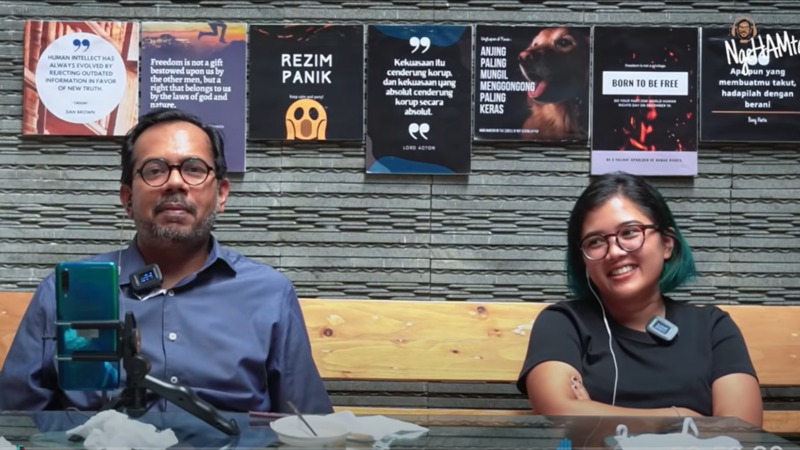
Human rights defenders Haris Azhar (left) and Fatia Maulidiyanti were accused of defaming a senior minister of the Indonesian government. Screenshot from YouTube video on HARIS AZHAR‘s channel. Fair use.
A Jakarta court in Indonesia has acquitted two human rights defenders who were earlier indicted for allegedly defaming a government minister.
In a YouTube video posted in August 2021, activists Fatia Maulidiyanti and Haris Azhar discussed the destructive impact of mining in Papua and the role of the military in protecting big business interests in the province. They also mentioned local reports about the role of officials in mining, including Luhut Binsar Pandjaitan, the coordinating minister of maritime and investment affairs, and a former military general in Papua. Pandjaitan denied having links to mining interests and subsequently filed a defamation case against Maulidiyanti and Azhar. He demanded an apology and 100 billion rupiah (approximately USD 6.5 million) in compensation.
The trial started in April 2023, an indictment was issued by prosecutors in November, and a total of 32 hearings were held before the court dismissed the charges on January 8.
An excerpt of the acquittal decision stated that there was no element of insult or defamation since “what was found in the video was a study, opinion analysis and assessment of the results of a study carried out by a civil society coalition.”
Father Alexandro Rangga, executive director of the Franciscan’s Secretariat for Justice, Peace and Integrity of Creation in Papua, welcomed the verdict and urged more people to speak on Papuan issues:
My hope is that more and more activists will have the courage to voice Papuan issues at the national level openly and accountability as a counter-narrative effort so that government policies will pay more attention to Papuan characteristics and local wisdom and take sides with the Papuan people.
Papua is a resource-rich province where intense military operations have been criticized by human rights groups for displacing local communities. Various groups have been asserting the Papuan right to self-determination and challenging the right of Indonesia to govern a territory it annexed in the 1960s.
𝐖𝐄 𝐖𝐎𝐍! 𝐅𝐀𝐓𝐈𝐀 𝐀𝐍𝐃 𝐇𝐀𝐑𝐈𝐒 𝐖𝐎𝐍! 𝐓𝐇𝐄 𝐈𝐍𝐃𝐈𝐆𝐄𝐍𝐎𝐔𝐒 𝐏𝐄𝐎𝐏𝐋𝐄 𝐎𝐅 𝐏𝐀𝐏𝐔𝐀 𝐖𝐎𝐍! Acquittal Verdict for Fatia and Haris as a Fresh Air and Hope to Democracy pic.twitter.com/8Ver9tj50T
— KontraS #FreeFatiaAndHaris🍉 (@KontraSupdates) January 11, 2024
Mary Aileen Diez-Bacalso, executive director of the Asian Forum for Human Rights and Development (FORUM-ASIA), insisted that the two activists should not have faced “judicial harassment” for speaking out on a matter of public interest:
The acquittal of Fatia and Haris sets a positive precedent against the criminalisation of human rights defenders. Nevertheless, they should not have been subjected to this judicial harassment in the first place. Fatia and Haris were simply doing their work by highlighting the potential human rights abuses committed by a government official. This is a matter of public interest.
The defamation case against Fatia and Haris is cited by activists as another proof of how authorities are weaponizing the Electronic and Information Transaction (EIT) Law. Josef Benedict, Asia Pacific researcher for civil society group CIVICUS, called on the government to review the repressive provisions of the law:
It must review and repeal all provisions inconsistent with international human rights laws and standards. The government must also end reprisals against human rights defenders and allow human rights defenders and civil society organisations to operate freely and safely.
According to the monitoring of Amnesty International Indonesia from 2019 to 2023, the EIT Law was arbitrarily used in the filing of at least 504 cases involving 535 people. Amnesty International Indonesia executive director Usman Hamid challenged presidential candidates in the February election to reform the law and release activists who have been detained for criticizing public officials.
The acquittal should now trigger the release of more activists, journalists, and anyone else detained solely for opposing or criticizing government policies or raising concerns about conflict of interests among state officials.
In the context of next month’s presidential elections, all candidates should fully demonstrate their commitment to freedom of expression, and publicly promote respect for human rights in their election platforms.
In a statement sent to the media, Minister Luhut said he would defer to public prosecutors about their next legal action.
We highly value our judicial system and hope that every legal process can be conducted in a more transparent and accountable manner for the sake of justice and truth. We also call on all parties to respect the legal process and wait patiently for each process.



